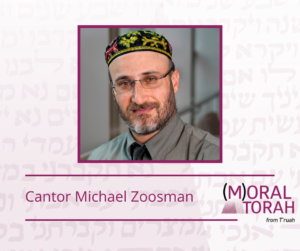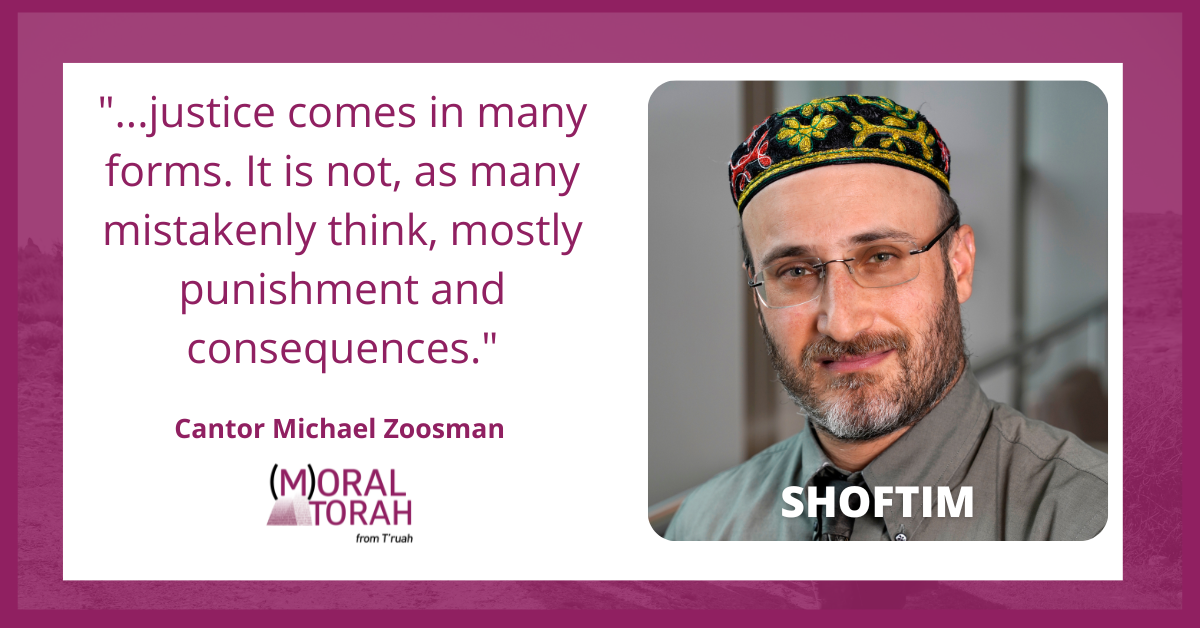A D’var Torah for Parshat Shoftim by Cantor Michael Zoosman
I do not believe in coincidences. Synchronicities, yes; coincidences, no.
As a hardened death penalty abolitionist and founder of “L’chaim! Jews Against the Death Penalty,” it is natural for me to write about Parshat Shoftim, which we read this Shabbat. It includes multiple references to cases where the death penalty is sanctioned in the Torah.
Indeed, Shoftim includes one of the most difficult verses for me to read: “Nor must you show pity: life for life, eye for eye, tooth for tooth, hand for hand, foot for foot.” (Deuteronomy 19:21) This parshah also includes one of the Torah’s most well-known mandates for social action in the famous call of “Tzedek, tzedek tirdof – Justice, justice shall you pursue.” (Deuteronomy 16:20)
Sign up to receive (M)oral Torah in your inbox each week.
What I did not know at the time I elected to write about Shoftim, months ago, is that the time slot I made in my calendar to write this d’var Torah would be only hours after learning of the passing of my beloved grandmother, Holocaust survivor Clara Grossman, Pesia bat Chaika, zichrona livracha (her memory for a blessing), at the age of 101.
Long before I became an active abolitionist, I was an active researcher alongside generations of my family, trying to pursue a specific kind of justice: namely, to discover the identity of the Polish Catholic farmer who was stabbed to death for refusing to give up the whereabouts of my grandmother and her sisters as they hid on his property during the Shoah/Holocaust. After nearly 40 years of active searching – and 80 years after his sacrifice – our family finally located the identity of this man: He was Mr. Michal Cegielski, of blessed memory. He will be formally inducted into the group of “Hasidei Ummot ha-Olam,” (“Righteous Members of the Nations of the World’) at Yad Vashem in a ceremony this fall.
I mention our family’s unique pursuit of justice for Mr. Cegielski z’l to emphasize that in fact justice comes in many forms. It is not, as many mistakenly think, mostly punishment and consequences. In our case, it came in the form of honoring a man without whose efforts I would not be alive today. I am starkly reminded here of how the Talmud instructed witnesses in capital offenses so that they understood the gravity of their role. From the Mishnah Sanhedrin 4:5:
How were the witnesses inspired with awe? Witnesses in capital charges were brought in and intimidated [thus]: “..in civil suits, one can make monetary restitution and thereby gain atonement [for an error]; but in capital cases one is held responsible for [the accused’s] blood and the blood of their[potential] descendants until the end of time. …. For this reason was Adam created alone, to teach you that whosoever destroys a single soul, scripture imputes [guilt] to them as though they had destroyed a complete world; and whosoever preserves a single soul, scripture ascribes [merit] to them as though they had preserved a complete world.”
There can be no doubt that Mr. Cegielski’s selfless actions saved generations of human beings in our family and enabled me to write these very words right now.
Find more commentaries on Parshat Shoftim.
It is this same Talmudic reference to “saving a life, saving a world” that informs my own kind of “pursuit of justice” as a death penalty abolitionist. I encounter many people in my advocacy who have little to no understanding of how rabbinic law – like in the very mishnah quoted above – made the imposition of the biblical death penalty so extremely difficult. (I have been called a slew of horrific names and been the subject of antisemitic attacks for our group’s advocacy for those facing death, particularly from some readers of our anti-death penalty blog in the Times of Israel.) Nor do they recognize that the trajectory of interpretations of biblical law over the millennia have led to an increasing consensus in the Jewish world that the death penalty is, indeed, an abomination. (Please see the sources that our partner Death Penalty Action has collected.) Instead, they, ironically, blindly invoke “eye for an eye,” and leave it at that.
And yet, we shall not stop this pursuit of restorative justice – a form of justice that ends the continuing cycle of killing and violence and reflects the necessary ingredients for humanity’s spiritual evolution, particularly in the wake of the onslaught of state-sanctioned murder that has taken place in the 20th and 21st centuries. It was none other than Elie Wiesel z’l who famously said of capital punishment: “Death is not the answer.” Prof. Wiesel also said this:
With every cell of my being and with every fiber of my memory I oppose the death penalty in all forms. I do not believe any civilized society should be at the service of death. I don’t think it’s human to become an agent of the angel of death.
 And so, on this Shabbat Shoftim, I offer a toast to my grandmother Clara Grossman, to her savior Michal Cegielski, and to all who have engaged in pikuach nefesh/saving a life and in “rescuing those taken off to death” (Proverbs 24:11), as we loudly chant: “Abolition, Abolition Shall You Pursue!” And, of course…
And so, on this Shabbat Shoftim, I offer a toast to my grandmother Clara Grossman, to her savior Michal Cegielski, and to all who have engaged in pikuach nefesh/saving a life and in “rescuing those taken off to death” (Proverbs 24:11), as we loudly chant: “Abolition, Abolition Shall You Pursue!” And, of course…
“L’chaim…to Life!”
Michael Zoosman is an ordained cantor (JTS, 2007), multifaith federal hospital chaplain, and former Jewish prison chaplain. He lives in Maryland with his wife and two daughters and is honored to be a T’ruah chaver (rabbinic member). He is the founder of “L’chaim! Jews Against the Death Penalty” and an Advisory Board Member at Death Penalty Action.

